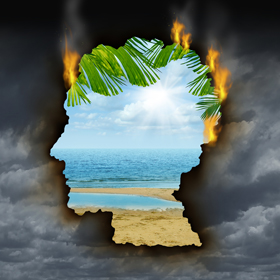Your Anxiety: Friend or Foe?
 What exactly is anxiety? Is it something to be dreaded or avoided? Is there anything useful or important about anxiety? Is anxiety a friend or a foe? Technically anxiety is a form of fear. Fear is a universal emotion, experienced in all cultures and across time throughout human history (all animals experience it too). Like all emotions, fear and anxiety serve useful functions even if the experience is not comfortable. Positive emotions like love and joy create pleasurable, engaging feelings that we typically want to hold onto. Difficult emotions like anger and fear typically create uncomfortable, distressing experiences that we want to get out of. But if you fearfully avoid situations habitually or too frequently, then you end up making fear your foe—and it can become a relentless one until you learn to face it (fortunately effective therapy for fear, anxiety, and stress is available). First let’s look at how fear, at its very core, when functioning naturally and effectively, is actually your friend.
What exactly is anxiety? Is it something to be dreaded or avoided? Is there anything useful or important about anxiety? Is anxiety a friend or a foe? Technically anxiety is a form of fear. Fear is a universal emotion, experienced in all cultures and across time throughout human history (all animals experience it too). Like all emotions, fear and anxiety serve useful functions even if the experience is not comfortable. Positive emotions like love and joy create pleasurable, engaging feelings that we typically want to hold onto. Difficult emotions like anger and fear typically create uncomfortable, distressing experiences that we want to get out of. But if you fearfully avoid situations habitually or too frequently, then you end up making fear your foe—and it can become a relentless one until you learn to face it (fortunately effective therapy for fear, anxiety, and stress is available). First let’s look at how fear, at its very core, when functioning naturally and effectively, is actually your friend.
While at times very uncomfortable, fear and anxiety is not usually your enemy. Fear and its related emotional states are responsible for the survival of the species because they warn you to avoid danger. If you did not have this evolutionary warning system, then when something truly dangerous presented itself, you would be at increased risk of getting harmed, injured, or even killed. This is because fear jolts the nervous system, kind of juices it up, to make your mind and body quickly take emergency measures to avoid getting harmed. So in this sense fear is a true ally, a true friend. Fear also has other positive values. It not only alerts to the presence of danger out in the world, but a bit of anxiety can accompany bodily responses as well. When you get anxious about various unexpected aches, pains, tingles in your body, then fear is alerting you to the possibility of disease or physical injury to possibly get needed medical treatment. Fear also can accompany your thinking, and manifests as worry or apprehension. In this case it causes an intense inner focus on thoughts and ideas: You may feel vague apprehensions and worries because you have forgotten something important, and your anxiety is pulling you inward to try and remember it. You may feel the tug of anxiety as you turn over thoughts about an important project, an issue in a love relationship, or are inwardly reflecting about a difficult dilemma. The fear is helping you to probe, think, and ponder all the different dimensions of the inner problem you are trying to solve.
Fear can also be your friend when it causes you to look at your life in a broader way, taking on an existential quality—am I leading the right kind of life? This can happen when one day you wake up and really take stock of your life direction. What am I moving towards in my life that is meaningful, important, and makes life worthwhile? If in fact you haven’t really examined your life and are on “autopilot”, your fears, worries, and apprehensions about your life direction can cause you to reflect deeply on what makes life worth living. In essence, you become concerned and worried about habitual, deadening modes of existence that rob you of a sense of purpose and meaning in life (e.g. too much TV, video, media, food, alcohol, and other distractions). Such reflection can then lead to taking meaningful action to attain a life worth living.
Our fear is a tricky critter though and has another, all too familiar side. Normal, helpful or friendly fear can appear to turn on you, causing torment and despair. When this occurs fear has you in its grip and is no longer helpful or “friendly”. The turning of fear upon the self happens when you lose track of the helpful and positive messages in fear and start viewing situations, thoughts, inner feelings, and outer circumstances in an overly threatening, scary manner. You actually contribute to this process through habitual avoidance of situation and activities that are not truly dangerous, which heightens your fear response, and leads to more avoidance. This progression is helped along by failing to understand the positive function of “friendly fear or anxiety”. Life inevitably has ups and downs. The downs inevitably cause some pain and are distressing. When you seek to avoid life’s inevitable pains, then the pain becomes more than just pain—you begin to fear it, start avoiding it, and never learn to accept and confront it. Life is bearable when you accept its inevitable ups and downs, but becomes truly unbearable, when you fear and automatically seek to avoid.
Here fear is no longer your friend, and is now becoming your foe or enemy. Essentially you are now overreacting to life’s expected flow of difficulties and you have given your power away to your fears. Because fear now involves intense suffering and does not easily go away when outer and inner circumstances are actually safe, it seems intolerable, insurmountable, and you want to escape this horrible situation at all costs. Fear or anxiety then inflects or turns upon itself and you may develop fear of having fear itself. When you are afraid of your natural fear response, a vicious cycle of fear and avoidance can develop: since you do not want to feel fear, you avoid it at all costs, but when you avoid something that is not truly warranted by the circumstances, you never learn to figure out that there is nothing to be afraid of. Unfortunately irrational, unwanted fear can attach to just about anything: specific situations (driving, heights, bridges, enclosures, etc), social situations (ranging from small talk to speaking up in a group), being out in public, and you may even fear your own emotions (e.g. rather than accept emotions like occasionally getting angry or frustrated, you fear your own emotions—you may be afraid to show or even feel anger; some people are even afraid of positive feelings like love, because they fear getting hurt),
Fear can now become quite irrational and persistent. The end result is getting locked in a vicious cycle of fear and avoidance. If fear were compared to a dog, it is chasing its own tail. At this point your exaggerated fear response may become a full blown Anxiety Disorder. However, thankfully there is actually a very effective and direct method to overcome your irrational fears: you can slowly learn to confront them (yes, they will actually go away the more you do so) and accept, without avoiding, life’s inevitable ups and downs. Actively seek to learn from your fear. Clarify if there is anything important it is trying to tell you (fear as friend) or does it have you in its grip, coloring and twisting your thoughts and perceptions (fear as foe). To confront ones fear by not avoiding the feared situation, you take your power back and return it to its natural state as just one emotion among many that are there to serve you.
If you are struggling with anxiety, fear, stress or other important unresolved issues, you deserve to get the help you need to lead a better, more fulfilling life. Feel free to call me anytime. It can be a great relief to open up about your concerns to a trained professional.
Thank you for reading this article and I hope it was helpful. Good luck! Please post your comments or reactions on my website. To get more information on important wellness and mental health issues please go to The Ryan Review.




